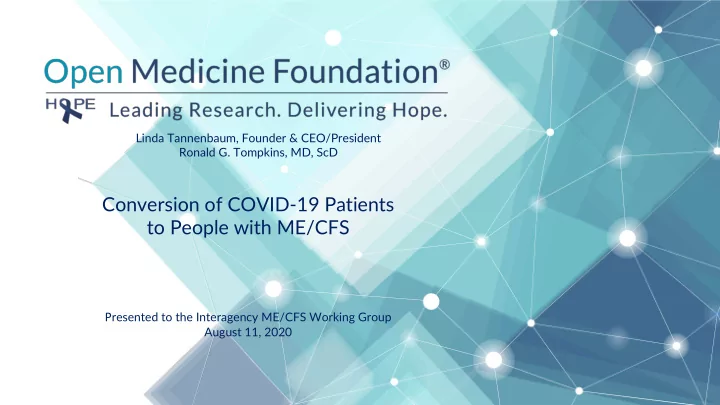

Linda Tannenbaum, Founder & CEO/President Ronald G. Tompkins, MD, ScD Conversion of COVID-19 Patients to People with ME/CFS P resented to the Interagency ME/CFS Working Group August 11, 2020
OMF Established Collaborative Research Centers Collaborative Center Collaborative Center @ Stanford @ Harvard Collaborative Center Collaborative Center @ Uppsala @ Montreal
OMF Established Collaborative Research Centers COVID-19 ME/CFS Research Project Established in 2012, Open Medicine Foundation (OMF) leads the largest, concerted worldwide nonprofit effort to diagnose, treat, and ultimately prevent ME/CFS and related chronic complex diseases (CCD). We fund innovation and research with impeccable credibility, informed by the knowledge that only serious investment will allow us all to fight these life-altering, devastating, and woefully underfunded diseases. Within this research project, we seek to understand pathological mechanisms that lead to Myalgic Encephalomyelitis/ Chronic Fatigue Syndrome (ME/CFS) after infection with COVID-19.
OMF Established Collaborative Research Centers COVID-19 ME/CFS Research Project OPPORTUNITIES 1. The current pandemic offers an opportunity to prospectively follow patients with severe COVID-19 in the longer term to identify pathophysiological features that can be associated with those who ultimately develop ME/CFS 2. Reports suggest 24 – 75% of patients with SARS CoV-1, MERS CoV-1 , West Nile, Dengue, and Ebola are at risk for ME/CFS. For severe SARS CoV-2, this risk might reasonably be expected to exceed 50% 3. It is not known whether severity of the viral illness influences the risk for ME/CFS 4. By prospectively evaluating genomics, proteomics, and metabolomics, an opportunity to identify those who are at high risk for development of ME/CFS 5. These studies allow the identification of drug targets and potential biomarkers and the opportunity to develop prevention strategies and treatments for the future
OMF Established Collaborative Research Centers COVID-19 ME/CFS Research Project Phase 1 / Aim 1 – Hospitalized COVID-19 ICU patients In blood and cerebrospinal fluid (CFS), multiple “omics” analyses will be performed using RNA-seq, targeted and non-targeted proteomics, targeted metabolomics and non-targeted metabolomics, whole genome sequencing, and microRNA assays. Comparisons will be made to a tremendous database acquired during a Glue grant program funded by the NIGMS to understand the genomics, proteomics, and metabolomics of massive injuries. Hypothesis The host-response from SARS CoV-2 in the ICU COVID-19 patient will be comparable to that found in our prior injury studies. Biomarkers, drug targets potentially will be identified for prediction and recovery clinical trajectories.
OMF Established Collaborative Research Centers COVID-19 ME/CFS Research Project Phase 2 / Aim 2 – Six months post-discharge First six months out of a 24-month follow up longitudinal study on COVID-19 discharged patients will be performed using the same “omics” mentioned in Phase 1. Identify differences between COVID-19 patients who fully recover within six months versus those whose pathological fatigue persists or worsens 6 months post-discharge. Following recovery trajectories from an initial trigger event will enable differences to be identified between recovery, post-viral fatigue, and ME/CFS over multiple time points. There is potential for the development of biomarkers, treatment targets, and preventative strategies.
OMF Established Collaborative Research Centers COVID-19 ME/CFS Research Project Phase 3 / Aim 3 – Six to 24 months post-discharge For those patients who have persistent, pathological fatigue at six months, another 18-month long-term longitudinal study on COVID-19 patients will be performed. The same “omics” (RNA-seq, targeted and non-targeted proteomics, targeted metabolomics and non- targeted metabolomics, whole genome sequencing, and microRNA assays) will be performed. Relating these omics over these 24 months and correlating symptoms and questionnaires and other health data will inform on those who are at high risk for development of ME/CFS. These studies are underway at the OMF Collaborative Research Centers and are currently and initially supported by philanthropic funds. A more comprehensive program is pending review for support by the Department of Defense through the Congressionally-Directed Medical Research Program (CDMRP).
OMF Established Collaborative Research Centers COVID-19 ME/CFS Research Project As data becomes available, we will share it with over 100 researchers within our working groups. Research data is shared on our OMF website data platform for scientists. Throughout our study, and as results become available, we will provide meaningful and accessible updates to our constituents. $1 Million has been secured and we have begun the process of collecting samples at all four Collaborative Research Centers. As more funding is confirmed, we will assemble the scientific team, and plan for the three phases of the study.
z Linda Tannenbaum, Founder & CEO/President ltannenbaum@omf.ngo www.omf.ngo
Recommend
More recommend